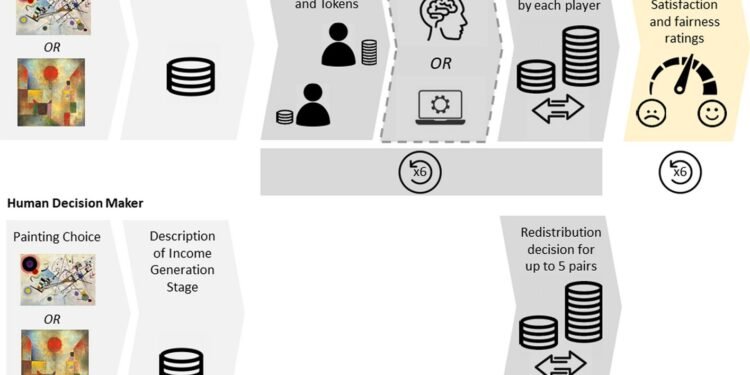
A new study has revealed that people prefer artificial intelligence (AI) over humans when it comes to redistributive decisions.
As technology continues to integrate into various aspects of public and private decision-making, understanding public perception and satisfaction and ensuring the transparency and accountability of algorithms will be key to their acceptance and effectiveness.
The study, conducted by researchers from the University of Portsmouth and the Max Planck Institute for Innovation and Competition, looked into public attitudes towards algorithmic versus human decision-making and examined the impact of potential discrimination on these preferences. The research is published in the journal Public Choice.
An online decision experiment was used to study the preference for human or AI decision makers, where the earnings of two people could be redistributed between them after a series of tasks were performed. More than 200 participants from the U.K. and Germany were asked to vote on whether they wanted a human or an algorithm (AI) to make the decision that would determine how much money they earned.
Contrary to previous findings, more than 60% of participants chose AI over a human to decide how the earnings were redistributed. Participants favored the algorithm, irrespective of potential discrimination. This preference challenges the conventional notion that human decision-makers are favored in decisions involving a “moral” component such as fairness.
However, despite the preference for algorithms, when rating the decisions taken participants were less satisfied with the decision of the AI and found it less “fair” than the one taken by humans.
Subjective ratings of the decisions are mainly driven by participants’ own material interests and fairness ideals. Participants could tolerate any reasonable deviation between the actual decision and their ideals but reacted very strongly and negatively to redistribution decisions that were not consistent with any of the established fairness principles.
Dr. Wolfgang Luhan, Associate Professor of Behavioral Economics in the School for Accounting, Economics and Finance at the University of Portsmouth and corresponding author of the study, said, “Our research suggests that while people are open to the idea of algorithmic decision-makers, especially due to their potential for unbiased decisions, the actual performance and the ability to explain how they decide play crucial roles in acceptance. Especially in moral decision-making contexts, the transparency and accountability of algorithms are vital.
“Many companies are already using AI for hiring decisions and compensation planning, and public bodies are employing AI in policing and parole strategies. Our findings suggest that, with improvements in algorithm consistency, the public may increasingly support algorithmic decision makers even in morally significant areas.
“If the right AI approach is taken, this could actually improve the acceptance of policies and managerial choices such as pay rises or bonus payments.”
More information:
Marina Chugunova et al, Ruled by robots: preference for algorithmic decision makers and perceptions of their choices, Public Choice (2024). DOI: 10.1007/s11127-024-01178-w
University of Portsmouth
Citation:
Online experiment reveals people prefer AI to make redistributive decisions (2024, July 16)
retrieved 16 July 2024
from https://techxplore.com/news/2024-07-online-reveals-people-ai-redistributive.html
This document is subject to copyright. Apart from any fair dealing for the purpose of private study or research, no
part may be reproduced without the written permission. The content is provided for information purposes only.






![[ENCORE] Historically Black Universities: Adapting Amid Affirmative Action Changes](https://lbnntv.com/wp-content/uploads/2023/12/ENCORE-Historically-Black-Universities-Adapting-Amid-Affirmative-Action-Changes-120x86.jpg)



